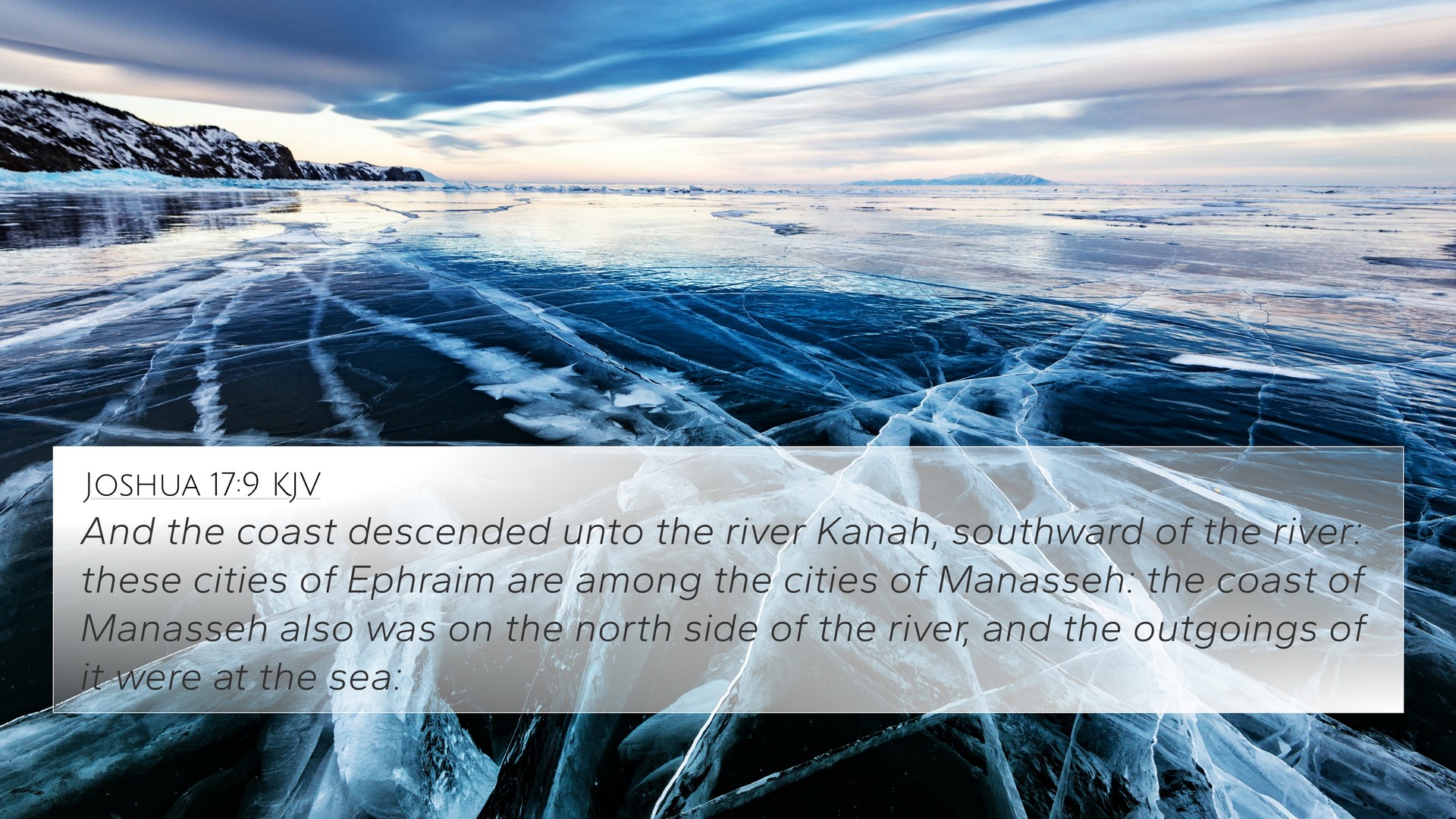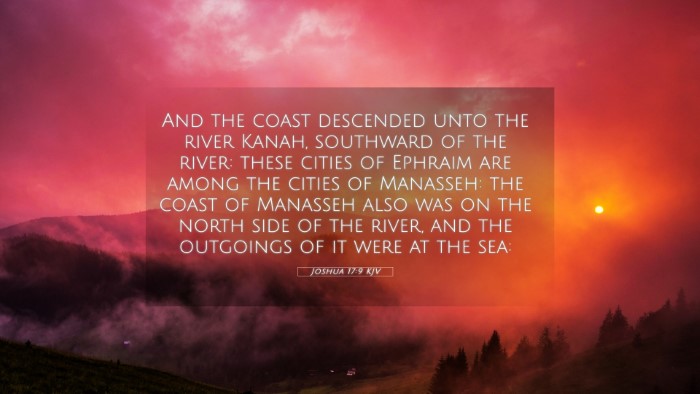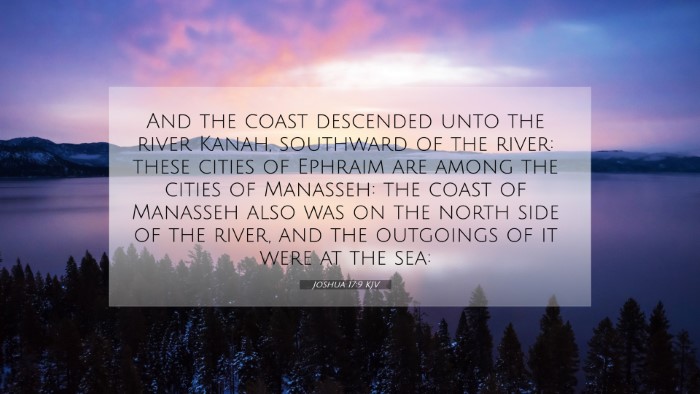Old Testament
Genesis Exodus Leviticus Numbers Deuteronomy Joshua Judges Ruth 1 Samuel 2 Samuel 1 Kings 2 Kings 1 Chronicles 2 Chronicles Ezra Nehemiah Esther Job Psalms Proverbs Ecclesiastes Song of Solomon Isaiah Jeremiah Lamentations Ezekiel Daniel Hosea Joel Amos Obadiah Jonah Micah Nahum Habakkuk Zephaniah Haggai Zechariah MalachiJoshua 17:9 Similar Verses
Joshua 17:9 Cross References
And the coast descended unto the river Kanah, southward of the river: these cities of Ephraim are among the cities of Manasseh: the coast of Manasseh also was on the north side of the river, and the outgoings of it were at the sea:
Uncover the Rich Themes and Topics of This Bible Verse
Listed below are the Bible themes associated with Joshua 17:9. We invite you to explore each theme to gain deeper insights into the Scriptures.
Joshua 17:9 Cross Reference Verses
This section features a detailed cross-reference designed to enrich your understanding of the Scriptures. Below, you will find carefully selected verses that echo the themes and teachings related to Joshua 17:9 KJV. Click on any image to explore detailed analyses of related Bible verses and uncover deeper theological insights.
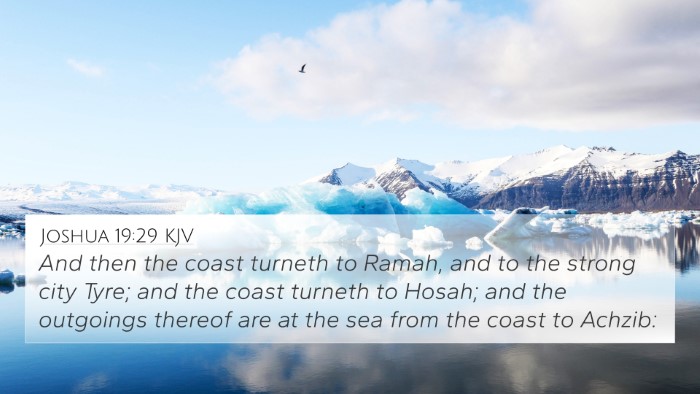
Joshua 19:29 (KJV) »
And then the coast turneth to Ramah, and to the strong city Tyre; and the coast turneth to Hosah; and the outgoings thereof are at the sea from the coast to Achzib:
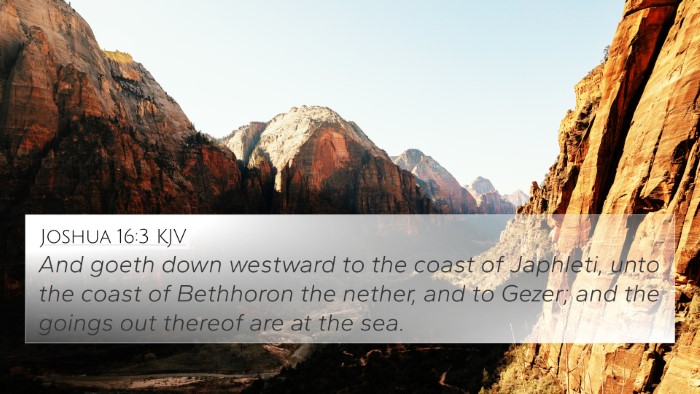
Joshua 16:3 (KJV) »
And goeth down westward to the coast of Japhleti, unto the coast of Bethhoron the nether, and to Gezer; and the goings out thereof are at the sea.
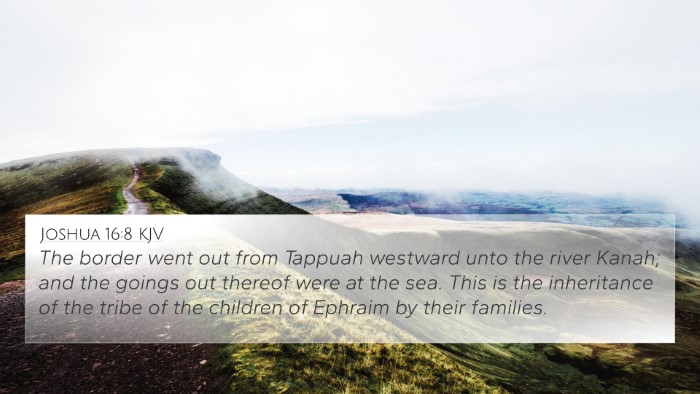
Joshua 16:8 (KJV) »
The border went out from Tappuah westward unto the river Kanah; and the goings out thereof were at the sea. This is the inheritance of the tribe of the children of Ephraim by their families.
Joshua 17:9 Verse Analysis and Similar Verses
Understanding Joshua 17:9
Joshua 17:9 states, "The border went down to the river Kanah, southward of the river; these cities of Ephraim are among the cities of Manasseh: the border of Manasseh was on the north side of the river, and the outgoings of it were at the sea."
Context and Significance
In the book of Joshua, the allocation of land to the Israelites is described in great detail. This specific verse outlines a part of the inheritance given to the tribe of Manasseh, indicating the boundaries of their territory. Understanding this verse requires an exploration of its geographical, historical, and theological contexts.
Commentary Insights
Matthew Henry's Commentary
Matthew Henry notes that the border described in this verse serves to map the land of promise accurately. Manasseh, being a significant tribe, received a strategic location which included both fertile land and natural boundaries such as rivers. This allocation signifies God's fulfillment of promises made to His people regarding their inheritance.
Albert Barnes' Commentary
Albert Barnes emphasizes that the reference to the river Kanah is crucial for understanding the geography of the region. The delineation of borders helps to distinguish not just the land of Manasseh but also its relations with neighboring tribes like Ephraim. Barnes points to how these geographical markers not only serve practical purposes but also carry spiritual implications, reflecting God’s providence.
Adam Clarke's Commentary
Adam Clarke provides insights into the significance of this passage within the broader narrative of land distribution. He highlights the importance of ancestral lands and their role in maintaining family identity among the tribes of Israel. Clarke suggests that the rivers and cities named in the passage were more than mere boundaries; they represented the fulfillment of God’s promises and the continuity of the Israelite identity.
Related Bible Verse Cross-References
- Genesis 48:14 - Jacob blesses Ephraim and Manasseh, indicating their significance.
- Numbers 34:2 - The Lord instructs Moses on how the land of Canaan is to be divided.
- Joshua 16:5-9 - Details the boundaries of the land given to Ephraim, highlighting connections to Manasseh.
- Joshua 18:11-14 - Explains the land allocation process and its importance.
- Deuteronomy 3:13 - A reminder of the land given to the half-tribe of Manasseh.
- 1 Chronicles 5:23 - Discusses the prosperity of the tribe of Manasseh in their territory.
- John 7:42 - References the lineage related to Ephraim, showing continuity of significance throughout Scriptures.
Thematic Connections
This verse serves as a remarkable example of the themes of inheritance and divine promise. It illustrates how God fulfills His promises through the establishment of boundaries that define the identities of His people. The intricate relationship between the tribes mirrored the complex spiritual journey of Israel and its dependence on God's guidance.
Conclusion
Joshua 17:9 isn't just a geographical reference; it encapsulates themes of identity, promise, and the fulfillment of God's word. For those interested in exploring further, cross-referencing this verse with others listed above can enrich one’s understanding of Biblical geography, history, and theology.
Final Thoughts on Bible Cross-Referencing
Cross-referencing Bible verses is essential for gaining deeper insights. It allows readers to see connections between different texts, enhancing their understanding of themes. Tools like a Bible concordance or cross-reference guide can facilitate this study, helping individuals identify links between Old and New Testament teachings.
